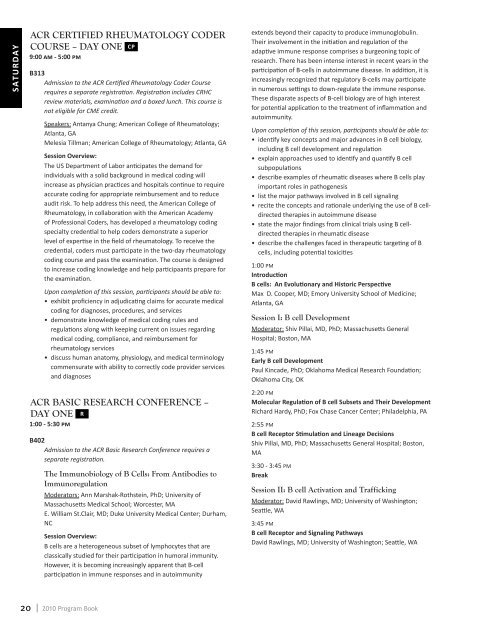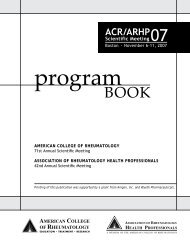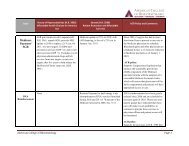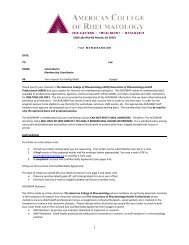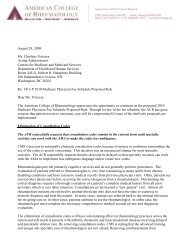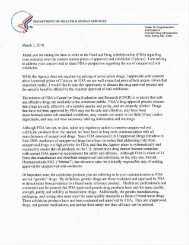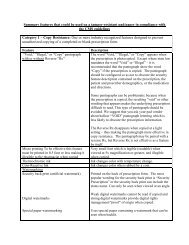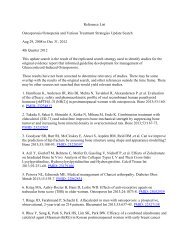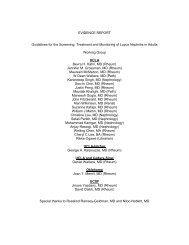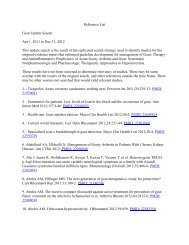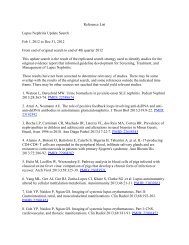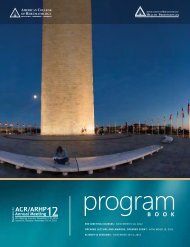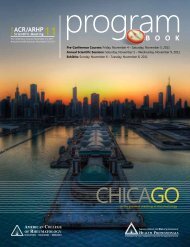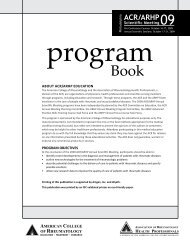B O O K - American College of Rheumatology
B O O K - American College of Rheumatology
B O O K - American College of Rheumatology
Create successful ePaper yourself
Turn your PDF publications into a flip-book with our unique Google optimized e-Paper software.
saturday<br />
ACR Certified <strong>Rheumatology</strong> Coder<br />
Course – Day One cP<br />
9:00 am - 5:00 pm<br />
B313<br />
Admission to the ACR Certified <strong>Rheumatology</strong> Coder Course<br />
requires a separate registration. Registration includes CRHC<br />
review materials, examination and a boxed lunch. This course is<br />
not eligible for CME credit.<br />
Speakers: Antanya Chung; <strong>American</strong> <strong>College</strong> <strong>of</strong> <strong>Rheumatology</strong>;<br />
Atlanta, GA<br />
Melesia Tillman; <strong>American</strong> <strong>College</strong> <strong>of</strong> <strong>Rheumatology</strong>; Atlanta, GA<br />
Session Overview:<br />
The US Department <strong>of</strong> Labor anticipates the demand for<br />
individuals with a solid background in medical coding will<br />
increase as physician practices and hospitals continue to require<br />
accurate coding for appropriate reimbursement and to reduce<br />
audit risk. To help address this need, the <strong>American</strong> <strong>College</strong> <strong>of</strong><br />
<strong>Rheumatology</strong>, in collaboration with the <strong>American</strong> Academy<br />
<strong>of</strong> Pr<strong>of</strong>essional Coders, has developed a rheumatology coding<br />
specialty credential to help coders demonstrate a superior<br />
level <strong>of</strong> expertise in the field <strong>of</strong> rheumatology. To receive the<br />
credential, coders must participate in the two-day rheumatology<br />
coding course and pass the examination. The course is designed<br />
to increase coding knowledge and help participaants prepare for<br />
the examination.<br />
Upon completion <strong>of</strong> this session, participants should be able to:<br />
• exhibit pr<strong>of</strong>iciency in adjudicating claims for accurate medical<br />
coding for diagnoses, procedures, and services<br />
• demonstrate knowledge <strong>of</strong> medical coding rules and<br />
regulations along with keeping current on issues regarding<br />
medical coding, compliance, and reimbursement for<br />
rheumatology services<br />
• discuss human anatomy, physiology, and medical terminology<br />
commensurate with ability to correctly code provider services<br />
and diagnoses<br />
extends beyond their capacity to produce immunoglobulin.<br />
Their involvement in the initiation and regulation <strong>of</strong> the<br />
adaptive immune response comprises a burgeoning topic <strong>of</strong><br />
research. There has been intense interest in recent years in the<br />
participation <strong>of</strong> B-cells in autoimmune disease. In addition, it is<br />
increasingly recognized that regulatory B-cells may participate<br />
in numerous settings to down-regulate the immune response.<br />
These disparate aspects <strong>of</strong> B-cell biology are <strong>of</strong> high interest<br />
for potential application to the treatment <strong>of</strong> inflammation and<br />
autoimmunity.<br />
Upon completion <strong>of</strong> this session, participants should be able to:<br />
• identify key concepts and major advances in B cell biology,<br />
including B cell development and regulation<br />
• explain approaches used to identify and quantify B cell<br />
subpopulations<br />
• describe examples <strong>of</strong> rheumatic diseases where B cells play<br />
important roles in pathogenesis<br />
• list the major pathways involved in B cell signaling<br />
• recite the concepts and rationale underlying the use <strong>of</strong> B celldirected<br />
therapies in autoimmune disease<br />
• state the major findings from clinical trials using B celldirected<br />
therapies in rheumatic disease<br />
• describe the challenges faced in therapeutic targeting <strong>of</strong> B<br />
cells, including potential toxicities<br />
1:00 PM<br />
Introduction<br />
B cells: An Evolutionary and Historic Perspective<br />
Max D. Cooper, MD; Emory University School <strong>of</strong> Medicine;<br />
Atlanta, GA<br />
Session I: B cell Development<br />
Moderator: Shiv Pillai, MD, PhD; Massachusetts General<br />
Hospital; Boston, MA<br />
1:45 PM<br />
Early B cell Development<br />
Paul Kincade, PhD; Oklahoma Medical Research Foundation;<br />
Oklahoma City, OK<br />
ACR Basic Research Conference –<br />
dAy One R<br />
1:00 - 5:30 pm<br />
B402<br />
Admission to the ACR Basic Research Conference requires a<br />
separate registration.<br />
The Immunobiology <strong>of</strong> B Cells: From Antibodies to<br />
Immunoregulation<br />
Moderators: Ann Marshak-Rothstein, PhD; University <strong>of</strong><br />
Massachusetts Medical School; Worcester, MA<br />
E. William St.Clair, MD; Duke University Medical Center; Durham,<br />
NC<br />
Session Overview:<br />
B cells are a heterogeneous subset <strong>of</strong> lymphocytes that are<br />
classically studied for their participation in humoral immunity.<br />
However, it is becoming increasingly apparent that B-cell<br />
participation in immune responses and in autoimmunity<br />
2:20 PM<br />
Molecular Regulation <strong>of</strong> B cell Subsets and Their Development<br />
Richard Hardy, PhD; Fox Chase Cancer Center; Philadelphia, PA<br />
2:55 PM<br />
B cell Receptor Stimulation and Lineage Decisions<br />
Shiv Pillai, MD, PhD; Massachusetts General Hospital; Boston,<br />
MA<br />
3:30 - 3:45 PM<br />
Break<br />
Session II: B cell Activation and Trafficking<br />
Moderator: David Rawlings, MD; University <strong>of</strong> Washington;<br />
Seattle, WA<br />
3:45 PM<br />
B cell Receptor and Signaling Pathways<br />
David Rawlings, MD; University <strong>of</strong> Washington; Seattle, WA<br />
20<br />
2010 Program Book


